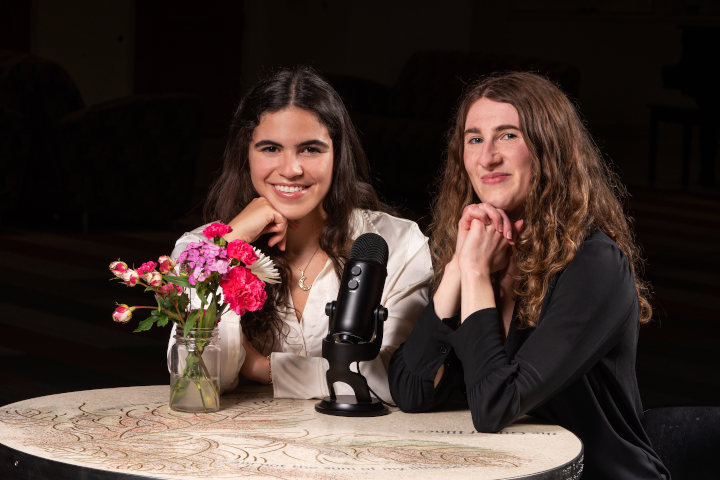Scholarship Donors Help Support Future Physicians
Wisconsin Medical Alumni Association matching funds helped create 32 new scholarships and enhance 16 existing scholarships.
In September 2020, Leigh Berman and Mayra Betancourt Ponce released the first episode of What Brings You in Today? (WBYIT), the first student-run, narrative-medicine podcast developed at the University of Wisconsin School of Medicine and Public Health Narrative medicine, a field at the intersection of health care and the humanities, calls upon storytelling to gain a deep understanding of people’s experiences and enhance empathetic, patient-centered care. The podcast has more than 5,000 listeners.
In the first episode, Berman and Betancourt Ponce featured an essay — “An Ode to My Ladies,” by Christine Seibert, MD, professor, Department of Medicine and Associate Dean of Medical Student Education and Services — which explored how the COVID-19 pandemic has affected patient-physician relationships. The moderators have covered a variety of stories about medical training and practice, highlighting the fluidity of experiences in this field and emphasizing the humanistic side of medicine. Themes have included death and dignity, failure in medicine, truths hidden in medical memes on social media, and creativity in medicine, in which they featured “The Highest Bidder,” by Anne Jacobson, MD ’96. Medical students, residents, attending physicians, mental health providers, social workers and educators from throughout the nation have been guests.
Before creating WBYIT, Betancourt Ponce and Berman recognized a need for creative, reflective spaces within medical school. As second-year medical students, they bonded over a shared interest in journalism and writing and brainstormed ways to incorporate these passions into their medical training. This inspired them to create the SMPH’s Medical Writing Interest Group, which produces an online journal, The Script, that features written works and artwork by members of the school community. Wanting to dive deeper into topics depicted in the journal—which often question what it means to be a medical student and to practice medicine—they pursued podcasting, an interview-based and social media-driven modality, as their second creative project. As they look back on that decision, it seems like a bold move, given that neither had experience with podcasting. Nevertheless, they have enjoyed the learning process and appreciated the support from School of Medicine and Public Health administrators and the Kern National Network on Caring and Character, which was established in partnership with the school and six other medical schools.

Crucial to Berman and Betancourt Ponce’s success in creating a space for narrative medicine at the school was forming a group of like-minded medical students interested in the medical humanities. Group members develop podcast content, share ideas about potential themes and guests, produce the podcasts and run its social media account. The team also includes a paid undergraduate student affiliated with the UW–Madison Department of Life Sciences Communication College of Agricultural and Life Sciences, who artistically edits recorded interviews into podcast episodes. Betancourt Ponce and Berman served as hosts for the podcast’s first season before they transitioned into production-focused roles. They ensured the project’s sustainability by inviting two team members to take over as hosts. They hope new undergraduate and medical students will join the WBYIT team every year and will find value in engaging with narrative medicine.
Berman and Betancourt Ponce–who refer to themselves as “partners in crime”— agree that creating WBYIT has been one of their most formative experiences during their time at UW. As they have advanced through their medical training, they have recognized valuable skills they gained from this project. In addition to learning what goes into producing a podcast, they have developed active, empathetic listening practices; written and verbal communication abilities; and team-management strategies—skills that can be directly applied to their daily lives and to patient care. Moreover, having a space to question what it means to be in medicine, reflect on their lived experiences, discuss problems within the field, and connect with individuals in different career stages has helped make their medical education exciting and well-rounded. The two also recognize this project as a form of “burnout prevention” for themselves and potentially for other students, as narrative medicine challenges the fast-paced and often isolating culture of medicine by inviting individuals to share stories, which fosters a sense of community.
As Berman begins a psychiatry residency and Betancourt Ponce focuses on the research portion of her dual MD/PhD in the Medical Scientist Training Program—and with others at the helm of WBYIT — the duo is looking for new ways to engage with narrative medicine. Because they believe medical students benefit from being exposed to this type of storytelling early in their training, Betancourt Ponce and Berman seek to develop modalities to help students learn about and engage with this growing field.
From effective communication to self-reflection, many of the skills and knowledge to be gained from narrative medicine seem inherent to the practice of medicine; however, narrative medicine is not explicitly included in most medical curricula. Berman and Betancourt Ponce are looking forward to helping incorporate narrative medicine principles into medical education by developing a variety of activities, lessons and platforms aimed at helping students practice critical patient-care skills, navigate the challenges and joys of this field, and find connections with their peers and themselves through the power of stories.